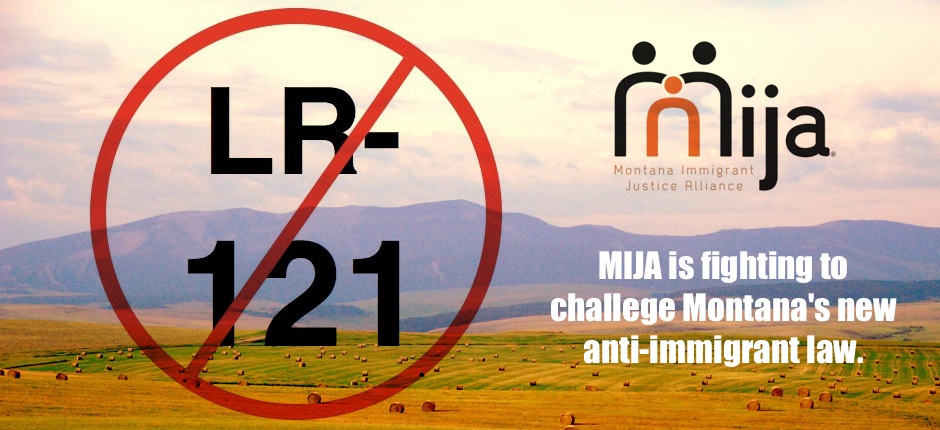Lawsuit Against LR-121
December 11, 2012Shahid Haque


On December 7, 2012, the Montana Immigrant Justice Alliance (“MIJA”) filed a lawsuit in Montana’s First Judicial District Court to challenge and enjoin implementation of LR-121. On June 20, 2014, Judge Jeffrey Sherlock of the First Judicial District Court struck down the vast majority of law, which would have required state agencies to determine an applicant’s citizenship or immigration status before granting a wide variety of state services. The law would have required denial of serves like unemployment insurance benefits, licenses to practice trades or professions, enrollment in state universities, crime victim services, and infant hearing screenings to those who cannot prove their citizenship or immigration status.
Litigation Updates:
12/19/2012 Update: Judge Sherlock has ordered the government Defendants to appear on February 7, 2013 at 10:00 am to “show cause why Plaintiffs’ application for a preliminary injunction should not be granted.”
01/28/2013 Update: We are pleased that two of the defendants in this litigation do not oppose our request for a preliminary injunction to stop LR-121 from being implemented. The Board of Regents and Commissioner of Higher Education are asserting that LR-121 is unconstitutional because it infringes on their authority to control the Montana University System, and we agree with their position.
02/07/2013 Update: The Honorable Judge Jeffrey Sherlock held a hearing on our request to enjoin the law, so that it cannot be enforced while our lawsuit is pending. Plaintiff Alisha Blair courageously testified about how LR-121 would affect her . She was joined by Andrea Carlson, a member of MIJA who was recently in removal proceedings until immigration attorney Shahid Haque proved her citizenship. Ms. Carlson was recently in the news herself when she took her oath of citizenship.
03/20/2013 Update: The State of Montana filed a motion to dismiss our lawsuit for lack of standing — contending that the Plaintiffs have not demonstrated that anyone would be harmed by LR-121. Today, we filed our response to challenge the state’s assertions, attaching affidavits of nine MIJA members who came forward to tell the court how they would be injured by LR-121. These affidavits share compelling stories about the real human beings who will be caught up in this badly designed law. Several of these members entered the United States illegally, but went through long and difficult processes to get their green cards. They now live here legally with their families. Nevertheless, LR-121 conflicts with federal law by saying that anyone who illegally entered the country is an “illegal alien” and will be denied state services — even if they now have green cards.
03/28/2013 Update: Judge Sherlock has granted a partial temporary restraining order, issuing “limiting constructions” on the ways that the State of Montana can implement LR-121. This order is significant because it constitutes the first decision in the State of Montana to address the constitutionality of any state-level enforcement of federal immigration laws. Please read the details here.
06/05/2013 Update: Judge Sherlock has rejected the Montana Attorney General’s efforts to dismiss our lawsuit, and has ruled that the Montana Immigrant Justice Alliance (MIJA) has standing to challenge LR-121 on behalf of its members, who have a reasonable fear that the law will be used to wrongly deny them benefits. Over ten members of MIJA, all of whom were also represented by Shahid Haque in immigration proceedings, came forward to tell the court how they would be impacted by LR-121. This story was also reported in the Great Falls Tribune.
05/29/2014 Update: We have completed extensive briefing and had a hearing before Judge Sherlock on both parties’ motions for summary judgment. We asked the Judge to enter judgment, without a trial, on the issue of federal preemption. The hearing went well, and we will await a decision as soon as Judge Sherlock can get to it. We believe we have proven that LR-121 is preempted by federal law.
06/20/2014 Update: Judge Jeffrey Sherlock of the First Judicial District Court struck down the vast majority of Montana’s voter-approved law requiring state agencies to determine an applicant’s citizenship or immigration status before granting a wide variety of state services. Judge Sherlock ruled in MIJA’s favor, holding that the mandates upon state agencies to determine immigration status, and deny a wide variety of state services to “illegal aliens,” are preempted by federal law as an impermissible regulation of immigration.
What is LR-121?
LR-121 was placed on the ballot by the 2011 Montana Legislature, and voters approved the referendum on November 6, 2012. However, the full implications of this referendum may not have been apparent to Montana voters when they cast they ballot. Voters were simply asked if they were FOR or AGAINST denying certain state services to illegal aliens. However, the ballot language did not adequately express the new burdens that all Montanans, including U.S. citizens, will have to face before accessing state services.
LR-121 imposes a sweeping new regulatory scheme that will affect the constitutional rights of almost all Montanans who apply for or use state services. The law now requires all Montanansto present documents to prove their citizenship or immigration status before accessing state services. The burden is now on the average Montanan to prove that they are here legally, or else they will be denied state services. The new law also subjects applicants to being screened through a federal database to confirm immigration status, and gives state agencies unrestricted authority to report applicants to the federal government if information cannot be confirmed.
How Will This Law Impact the Average Montanan?
For the first time in Montana’s history, the state will be requiring citizens to start carrying certain papers and presenting them before they can access basic state services. To be clear, the law imposes a mandate that all applicants for services to be screened for citizenship or legal immigration status, which includes every Montana resident. This imposes a restriction on the fundamental right to pursue life’s basic necessities as provided in Article II, Section 3 of the Montana Constitution.
The services that will now be conditioned on proof of citizenship include employment with a state agency, attendance a public university, ability to obtain student financial assistance, ability to obtain a license or permit to practice a trade or profession, eligibility for unemployment insurance, services for victims of crime, vocational rehabilitation, and certain services for the physically disabled.
Not All Montanans Have Proof of Their Citizenship
Not all Montanans have readily-available proof of their U.S. citizenship — in fact, studies show that nationally, about 7% of the population don’t have these documents. There are typically only two ways to prove you are a citizen: by providing a birth certificate or a U.S. passport. For many reasons, there are Montanans who don’t have copies of their birth certificates, and who have never gotten passports. Under this law, Montanans are losing privacy protections — state agencies are going to ask for your identity documents for basic services and deny you services if you can’t provide them.
In addition, due to the complexities of federal immigration law and the facts and circumstances of an individual’s life, a person can be a lawful U.S. citizen, and a resident of Montana, but lack documentary proof of their citizenship. For instance, Alisha Blair is a U.S. citizen who may be wrongly denied services under this law. Ms. Blair is a 22 year-old who grew up in Sunburst, Montana who automatically acquired U.S. citizenship at birth. She was born in Canada and has been residing in Montana since she was one year old. Her U.S. citizenship was transmitted to her at birth through her U.S. citizen father by operation of federal law, but she has never had any documents to prove her citizenship.
Our complaint includes an affidavit from Ms. Blair and another individual with a similar situation. The plight of a 65-year-old teacher from Fairfield, Montana provides another example of the type of person who will be caught in this system. There are many more lawful Montana citizens like these individuals who will be wrongly denied services under this law. By treating lawful Montana residents differently, without any legitimate reason, the law violates the equal protection clause of the Montana Constitution.
Ineffective Screening Through Federal Databases
If you don’t have documents to prove your citizenship of lawful resident status, the referendum suggests that state agencies can screen you through the Systematic Alien Verification for Entitlements (“SAVE”) system, a federal database that charges between $.50 and $2.00 for each search in the system. However, there is a significant limitation with this system: The SAVE program does not contain any information on native-born U.S. citizens, or most individuals who entered the country without inspection. SAVE can only verify information contained in immigrations records. Therefore, it only includes information on individuals who have applied for or received certain immigration benefits through interaction with relevant agencies within the U.S. government.
There is no federal database that is available to the State of Montana for benefit eligibility determinations that would provide a comprehensive listing of all U.S. citizens.
This means that in some ways, native-born U.S. citizens may have a harder time proving their status than a lawfully residing immigrant, because if you don’t have the documents in hand, there is no alternate way to verify your U.S. citizenship. Before implementing this law, state agencies must be called upon to explain how they can implement this law without violating the rights of U.S. citizens.
Violations of the Right to Privacy and Due Process
Under LR-121, lawful Montana citizens who don’t have proof of citizenship may be wrongly denied services that they are entitled to as taxpayers. To make matters worse, there are no due process protections outlined in the law, so there is no clear way to challenge a state agency’s decision if you are wrongly denied services.
There are also no restrictions in the law to protect privacy interests and limit dissemination of the information that is collected. When lawfully present U.S. citizens like Plaintiff Alisha Blair apply for state services, there is nothing prohibiting the State from classifying them as “illegal aliens” and then calling upon the Department of Homeland Security to investigate them. Indeed, the Act provides unrestricted discretion to state agencies to classify any applicant who cannot prove to the State’s satisfaction that he or she is a U.S. citizen as an “illegal alien” and report the individual to DHS.
Montanans value the privacy protections in our Constitution — protections that are greater than provided under federal law and most other states. That’s why we’ve fought back against attempts to create a national identification card, and led the nation in rejecting the federal REAL ID laws. However, based on the misguided goal of targeting undocumented immigrants (even anti-immigrant
groups estimate there are only 5,000 in our state) this referendum has subjected the State of Montana and its residents to far more invasive requirements than REAL ID ever contemplated.
Preemption by Federal Law
Not only does this burdensome regulatory scheme impact our constitutional rights, but it also violates federal law. Under the Supremacy Clause of the U.S. Constitution, the federal government alone has the power to enact and to enforce regulations concerning which non-citizens to admit, exclude, remove or allow to remain in the United States. The federal government has exclusive authority to classify non-citizens within this framework of laws regulating immigration. The states may not create their own distinct classifications of immigrants that differ from the classifications created by federal law.
LR-121 is preempted by federal law because it utilizes its own classification of non-citizens that conflicts with federal law. Section 6(b) of the Act defines an “illegal alien” as “an individual who is not a citizen of the United States and who has unlawfully entered or remains unlawfully in the United States.” The term “illegal alien” is not defined in the Immigration and Nationality Act (“INA”) or other federal laws regulating immigration, and the definition in this law conflicts with federal laws because there are numerous categories of noncitizens who illegally entered the United States, but do not illegally remain in the United States.
This is not a mere technicality, as this definition alone makes the law unconstitutional under the Supremacy Clause of the U.S. Constitution. The State of Alabama recently passed its own state law regulating immigration, and one provision was recently enjoined for the same reason, where it tried to create a separate classification of non-citizens who are entitled to different rights and privileges.
Conservatives and Progressives Alike Should Be Concerned About This Law
Whether you are a conservative or a progressive — Democrat or a Republican — LR-121 is bad policy for the State of Montana. Montana is one of the states with the least numbers of immigrants in the whole country. The violation of our privacy rights, delays or wrongful denial of services, and extra cost to the state are simply not justified by the stated goal of denying services to undocumented immigrants.
According to the Montana Budget and Policy Center, the cost to the State of Montana of implementing this law will be far higher than any savings from denying services to undocumented immigrants. In a time when the Montana Legislature is seeking to cut services to increase the budget surplus, this burdensome new regulatory scheme is counterintuitive.
Who is Representing the Plaintiffs in this Lawsuit?
This litigation is being done on a pro bono basis by Shahid Haque of the Border Crossing Law Firm, P.C. (also Executive Director of MIJA) and he was assisted by Brian J. Miller of Morrison, Motl and Sherwood, PLLP.
Contact Us
In addition, if you are a U.S. citizen or lawful resident who does not have proof of your citizenship, or are concerned about how this law will impact you, please contact us.

 Account
Account



 Shahid Haque, founder of the Border Crossing Law Firm, P.C., had fun talking to Kev Hamm for this week’s episode of his podcast,
Shahid Haque, founder of the Border Crossing Law Firm, P.C., had fun talking to Kev Hamm for this week’s episode of his podcast, 











